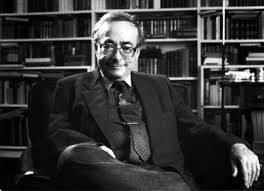Martin Jay at Salmagundi:
 And yet, despite his shifting placement in the dynamic force field of cultural politics, Steiner resisted turning into a curmudgeonly apologist for a world on the wane or allowing his Kulturpessimismus to sanction a resentful withdrawal from the public arena. In fact, one of the hallmarks of his career was a willingness to remain suspended within paradoxes, never forcing a simple choice between unpalatable options. This attitude was already evident in Language and Silence, which both celebrates humanistic high culture and acknowledges that the Holocaust has disabused us of the naïve illusion that it humanizes those who uphold it. Or as he put it in what is perhaps his most frequently cited sentences: “We come after. We know now that a man can read Goethe or Rilke in the evening, that he can play Bach or Schubert, and go to his day’s work at Auschwitz in the morning.”17 And yet, Steiner somehow never really faltered in his faith that great art remains the last refuge of meaningfulness in a world from which religious faith has fled.
And yet, despite his shifting placement in the dynamic force field of cultural politics, Steiner resisted turning into a curmudgeonly apologist for a world on the wane or allowing his Kulturpessimismus to sanction a resentful withdrawal from the public arena. In fact, one of the hallmarks of his career was a willingness to remain suspended within paradoxes, never forcing a simple choice between unpalatable options. This attitude was already evident in Language and Silence, which both celebrates humanistic high culture and acknowledges that the Holocaust has disabused us of the naïve illusion that it humanizes those who uphold it. Or as he put it in what is perhaps his most frequently cited sentences: “We come after. We know now that a man can read Goethe or Rilke in the evening, that he can play Bach or Schubert, and go to his day’s work at Auschwitz in the morning.”17 And yet, Steiner somehow never really faltered in his faith that great art remains the last refuge of meaningfulness in a world from which religious faith has fled.
more here.
